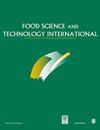Investigation of the effects of corn flour, Spirulina powder, and buffalo yogurt on the quality characteristics of gluten-free muffins
IF 1.8
4区 农林科学
Q3 CHEMISTRY, APPLIED
引用次数: 0
Abstract
This study aimed to investigate the properties of buckwheat flour-based gluten-free muffins formulated by using corn flour (CF), Spirulina powder (SP), and buffalo yogurt (BY) levels as the factors in the Box-Behnken experimental design. The color values, total soluble polyphenol content (TPC), radical scavenging activity (RSA), specific volume, moisture content, and baking loss results were evaluated as the response variables in the design. The buckwheat flour in the control sample was substituted with CF and SP. Cow yogurt was used in the control muffin instead of milk and was substituted with BY at different levels in other samples. Among the response variables, TPC and RSA values were selected for the optimization studies. Decreasing the CF and SP levels in the formulations resulted in observing higher TPC and RSA values. Three optimal formulations were obtained by response surface methodology. Both cow and buffalo yogurt did not change the properties of the muffins adversely compared to milk. Increasing the SP content made the muffins firmer and caused a decrease in the L*, a*, b*, and browning index values of the muffins. However, sensory scores of SP-containing muffins were also satisfactory.玉米粉、螺旋藻粉和水牛酸奶对无麸质松饼质量特性影响的研究
本研究旨在通过盒-贝肯实验设计,以玉米粉(CF)、螺旋藻粉(SP)和水牛酸奶(BY)含量为因子,研究以荞麦粉为基础配制的无麸质松饼的特性。色值、总可溶性多酚含量(TPC)、自由基清除活性(RSA)、比容、水分含量和烘焙损失结果作为设计的响应变量进行评估。对照样品中的荞麦粉用 CF 和 SP 代替。在对照松饼中使用牛酸奶代替牛奶,在其他样品中使用不同含量的 BY 代替牛奶。在响应变量中,选择了 TPC 和 RSA 值进行优化研究。降低配方中的 CF 和 SP 含量可观察到更高的 TPC 和 RSA 值。通过响应面法获得了三种最佳配方。与牛奶相比,奶牛和水牛酸奶并没有对松饼的特性产生不利影响。增加 SP 的含量会使松饼更松软,并降低松饼的 L*、a*、b* 和褐变指数值。不过,含 SP 的松饼的感官评分也令人满意。
本文章由计算机程序翻译,如有差异,请以英文原文为准。
求助全文
约1分钟内获得全文
求助全文
来源期刊
CiteScore
5.80
自引率
4.30%
发文量
63
审稿时长
18-36 weeks
期刊介绍:
Food Science and Technology International (FSTI) shares knowledge from leading researchers of food science and technology. Covers food processing and engineering, food safety and preservation, food biotechnology, and physical, chemical and sensory properties of foods. This journal is a member of the Committee on Publication Ethics (COPE).

 求助内容:
求助内容: 应助结果提醒方式:
应助结果提醒方式:


